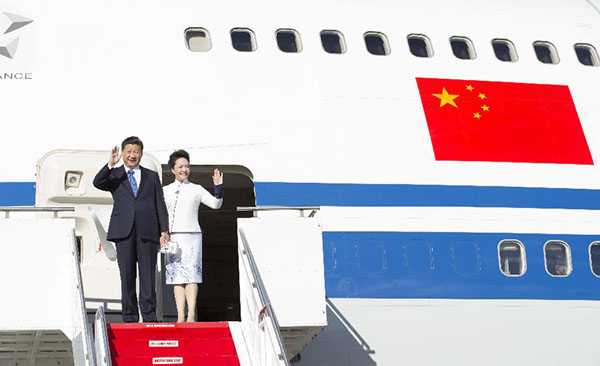 |
|
Chinese President Xi Jinping (L) and his wife Peng Liyuan wave upon their arrival in Seattle, the United States, Sept. 22, 2015. Xi arrived in this east Pacific coast city on Tuesday morning for his first state visit to the US. [Photo/Xinhua] |
Economic future bright
After the Purchase Manager Index, seen as a barometer of the economy, fell to 47 in September for the first time this year and other disappointing data, aroused widespread speculation about a "hard landing" for China's economy, many worried that China's slowdown might have a negative effect worldwide.
But President Xi Jinping eased the world's concerns about China's economy during his US visit, emphasizing China is undergoing economic restructuring and transformation, which might be a painful process but promises a brighter future.
China's relatively lower GDP growth rate compared with the past high-speed years, comes at a time when global economic growth has slowed and is in accordance with the global economic cycle.
Moreover, many technological breakthroughs have been achieved that will boost quality growth with innovation. In 2014, the State Intellectual Office accepted 928,000 patent applications, 12.5 percent higher than the previous year. In fact, the number of Chinese patents has been the most in the world for four successive years, implying a new cycle of prosperity.
The worry about China's monetary policies having a negative effect is even more unnecessary. The US Federal Reserve is globally influential because 60 percent of US dollars circulate overseas; by increasing or cutting interest rates, the Federal Reserve can easily inject inflation or deflation into emerging economies. China is pursuing the internationalization of the renminbi, but its currency is not so influential.
Dong Xiaojun is a professor on financial strategy at the Central Party School.
Boost to growth potential
During his just-concluded visit to the US, Chinese President Xi Jinping promised solemnly that China will never close its doors to global investors and businesses.
Opening up has been China's policy ever since the reform in 1978. It includes three principles that benefit both China and the world: China will use the foreign investment, protect investors' legal rights and provide better, more convenient services to them.
It was an open door that supported China's economic development for the past 36 years and made it the second largest economy of the world. The opening-up policy not only allowed Chinese economy to embrace that of the world, but also granted it an innovative mind to reform the outdate bureaucracies to release the potential of growth.
Currently, facing the slowdown and other problems with its economy, China needs more efforts to pass the tests of economic restructuring and transformation. That requires it to cling to the opening-up policy and show a more positive and confident gesture toward the world.
Weeks ago, in a jointly released official document, the Communist Party of China Central Committee and the State Council clearly said that opening-up is China's fundamental policy. In the coming years, China will further boost its potentials of growth and benefit the world with dividends.
Chen Fengying is a senior researcher on economics at China Institutes of Contemporary International Relations

I’ve lived in China for quite a considerable time including my graduate school years, travelled and worked in a few cities and still choose my destination taking into consideration the density of smog or PM2.5 particulate matter in the region.